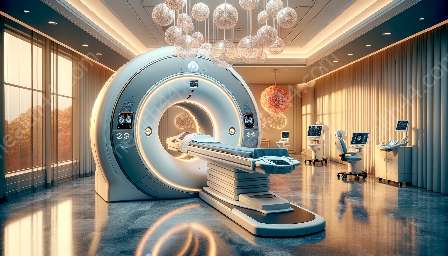Medical imaging devices have seen significant advancements with the introduction of CT scanners, revolutionizing the way various medical conditions are diagnosed and treated.
Understanding CT Scanners
CT (Computed Tomography) scanners are specialized medical imaging devices that use a combination of X-rays and computer technology to create detailed cross-sectional images of the body. This advanced technology allows healthcare professionals to obtain a clearer view of internal organs, tissues, and bones, aiding in the accurate diagnosis and treatment of various medical conditions.
CT scanners have evolved significantly since their inception, offering higher image resolution, faster scanning times, and enhanced patient comfort. These advancements have led to CT scanners becoming an indispensable tool in modern medical diagnostics.
Advancements in Medical Devices & Equipment
The integration of CT scanners within the realm of medical devices & equipment has brought about a remarkable transformation in the field of healthcare. By providing detailed, three-dimensional images of the body, CT scanners have improved the accuracy of diagnoses, thereby enabling healthcare professionals to develop more effective treatment plans.
Impact on Patient Care
Patients benefit from the advancements in CT scanners as they undergo faster and more accurate diagnostic procedures. The ability to visualize internal structures in great detail allows for earlier detection and intervention in various medical conditions, leading to improved patient outcomes and reduced risks in surgeries and other medical procedures.
Diagnostic Capabilities of CT Scanners
CT scanners excel in diagnosing a wide range of medical conditions, including but not limited to:
- Traumatic injuries such as fractures, internal bleeding, and organ damage
- Cardiovascular conditions such as coronary artery disease and blood clots
- Cancerous tumors and masses
- Neurological disorders like strokes, hemorrhages, and brain tumors
Additionally, CT scanners play a crucial role in guiding minimally invasive procedures, such as biopsies and catheter placements, by providing real-time imaging that helps healthcare professionals precisely target affected areas.
Technological Innovations
Recent advancements in CT scanner technology have further expanded its capabilities. Dual-energy CT scanners, for instance, can differentiate between various types of tissues and materials within the body, allowing for enhanced tissue characterization and improved visualization of certain conditions. Furthermore, the integration of artificial intelligence (AI) and machine learning algorithms has the potential to streamline image interpretation and aid in the early detection of abnormalities.
Future Implications
As technology continues to advance, the future of CT scanners holds the promise of even greater precision, reduced radiation exposure, and expanded applications in areas such as functional imaging and personalized medicine. These developments are set to further improve patient care and contribute to the ongoing evolution of medical devices & equipment.


